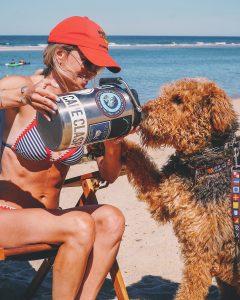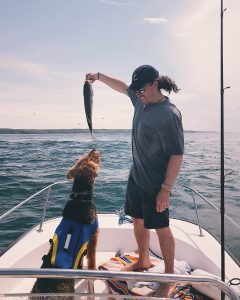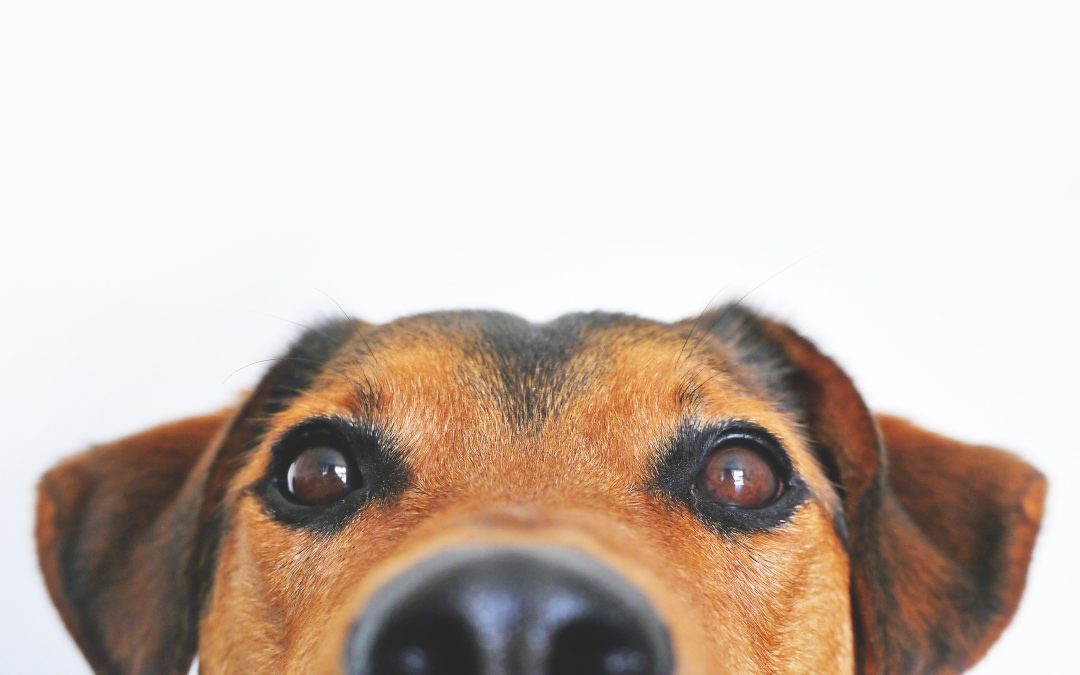By KAREN HUNTER
 Domesticated dogs, whose range of looks and personalities complement our lives in so many ways, have long been an integral part of the human experience in America.
Domesticated dogs, whose range of looks and personalities complement our lives in so many ways, have long been an integral part of the human experience in America.
They are our companions, our therapy pets, our exercise buddies, our soul mates, our “noise-makers,” our playmates. They bring us joy and comfort. When gone, we mourn a family member lost.
Yet for all the bonding between dogs and their people, dogs are still canines with canine needs, which we humans are responsible for addressing.
Food And Water
Food and water are the obvious place to start. Most “people food” is not good for dogs. “Snacks enjoyed by humans should not be a treat for dogs,” according to the American Society for the Prevention of Cruelty to Animals, which offers a “People Foods to Avoid Feeding Your Pets” page on its website. “Any change of diet, even for one meal, may give your dog severe digestive ailments,” the ASPCA says.
Chocolate, for example, is poisonous for dogs. Avoid feeding raisins, grapes, onions, garlic, baked goods, or products with the sweetener xylitol to dogs, the ASPCA says.
Special caution should be exercised at summer barbecues. Alcohol, beer, lighter fluid, and matches are poisonous to dogs. Greasy human table scraps, especially the kind found at summer barbecues, are toxic for dogs and can cause pancreatitis. Corn on the cob can cause severe body obstruction.
Dogs should always have access to fresh drinking water and a lot of it. In hot weather, dogs get thirstier than humans do. When leaving the house, it is best to leave two bowls of water in case one gets knocked over or emptied.
Collars
 Many dog owners now use vests instead of collars but if using a collar make sure it is not too tight by checking to see that two-to-three fingers can fit between the collar and the dog’s neck.
Many dog owners now use vests instead of collars but if using a collar make sure it is not too tight by checking to see that two-to-three fingers can fit between the collar and the dog’s neck.
In puppies, who grow fast, checking the collar every week is advised. “If not loosened,” the American Humane Society says, “collars can literally grow right into your pet’s neck, creating excruciating, constant pain.”
Friends of Falmouth Dogs, a rescue group in Falmouth, recommends the Martingale collar, which is a soft alternative to a choke collar. As with a choke collar, dogs cannot easily slip out of it or back out of it.
Safety Issues And Recommendations
When asked to list the first five dog safety recommendations that came to mind, Friends of Falmouth Dogs volunteer Mindy M. Hall said, “Make sure the dog has water; never leave a dog in a hot car; put identification tags on the dog’s collar or harness (listing the owner’s name and an emergency phone number) even if the dog has been micro-chipped; never leave a dog unattended in a yard even if the yard is fenced; and check yard fencing to be sure it is secure and that the dog cannot escape, especially after storms.
Jeff A. Genereux, owner of Uptown Dog in West Falmouth, said that while he finds most pet owners to be over-protective rather than negligent, he has heard some awful stories after dogs were left in the yard alone. Dogs under 20 pounds are easy prey for coyotes, and owners of dogs who weigh less than seven pounds need to watch out for hawk attacks, he said.
 Erika L. Grant, a sales associate at Baer’s Pet Depot on North Market Street in Mashpee, recommends that dogs always be leashed in public, both for their safety, and because some people do not like, are afraid of, or allergic to them. Ms. Grant said that when she formerly worked for Petco in Falmouth, it would upset her to see some customers let their dogs run free in the store parking lot.
Erika L. Grant, a sales associate at Baer’s Pet Depot on North Market Street in Mashpee, recommends that dogs always be leashed in public, both for their safety, and because some people do not like, are afraid of, or allergic to them. Ms. Grant said that when she formerly worked for Petco in Falmouth, it would upset her to see some customers let their dogs run free in the store parking lot.
The topic of heat and dogs becomes more urgent as summers become increasingly hot. One critical piece of information that bears repeating is that, unlike humans, dogs sweat very little in the heat. Instead, they cool themselves down by panting and drinking water. When the only air to breathe is hot or humid air, it is much harder for a dog to keep cool and they can quickly become dehydrated.
In the hot weather, dogs should always have access to water and shade. Ms. Hall said she recommends keeping dogs indoors in the heat, taking them outside only in early morning and early evening.
The ASPCA warns that dogs with flat faces, like pugs, are more susceptible to heat stroke since they cannot pant as effectively.
Experts on dog care consistently urge owners to never (ever) leave a dog in a hot car because dogs can develop heat stroke and suffocate within minutes if the car is too hot. Most people do not realize how hot the interior of a parked car becomes. On a 78-degree day, the interior temperature of a car parked in the shade can reach 90 degrees and up to 160 degrees if parked in the sun, according to one online source.
“It is upsetting to see dogs locked in ‘somewhat ventilated’ cars when the owners go in to eat dinner,” Mr. Genereux said (Uptown Dogs shares a parking lot with a restaurant).
Kiddy pools for dogs are also a great way for them to have fun in the heat and keep them cool, but be careful in larger pools. Most dogs instinctively know how to swim (except bulldogs, who cannot swim and will drown), but that does not mean that all dogs are good swimmers. Dogs who jump into a swimming pool might not be able to get out without help and could easily drown if not closely supervised. Rinse dogs off after swimming in a pool to remove chlorine and other chemicals from their fur and try to keep them from drinking the pool water.
Dogs, like people, should wear flotation devices when on boats (or in pools if not a good swimmer). Brightly colored life jackets are sold at many pet stores. Mr. Genereux said that his shop sells many of these life jackets to Cape Codders or visitors to the Cape who take their dogs on motorboats, sailboats and paddle boards.
Dogs can get sunburned, especially those with short or light-colored coats. Long-haired dogs should never be shaved, as their coats protect them from the sun. Sun screen can be used on dogs but only those labeled specifically for animal use, the ASPCA says.
Keep dogs’ paws off hot asphalt and away from metal truck beds in the summer, as hot asphalt and metal can burn their paws and increase their body temperatures. Pet stores sell rubber booties for dogs to protect paws against ice and snow melt, lawn chemicals, hot pavement, sand rashes and against bringing chemicals, dirt, and allergens into the house. Even if not interested in buying the booties, it is wise to be aware of and avoid the conditions that can damage a dog’s paws.
Riding Safely In A Vehicle
An open truck bed is not a safe place for dogs to travel, unless in a crate—which protects them from wind, weather, and hot sun—with the crate tied securely to the truck bed. The American Humane Society estimates that 100,000 dogs die each year by being thrown from the back of a truck when a sudden start, stop, or turn throws the dog into the highway where it can be hit by oncoming traffic. Leashing a dog inside a truck bed is also unsafe (and illegal in Massachusetts), and many dogs attached that way have been strangled when tossed or bumped over the side of the truck and been left helplessly dangling, the Humane Society says.
On the topic of car travel, while it is true that most dogs love to stick their heads out of open car windows, wind can seriously irritate mucous membranes and blow pieces of grit into dogs’ eyes, the Humane Society warns. Insects or flying debris can also lodge in nasal passages or get sucked into a dog’s windpipe.
Inside the car, dogs should travel in crates, or be restrained in dog seats, confined behind a dog gate in the back of the car, or tethered by harness to the seatbelt receptacle. This prevents the dog from escaping into the road in the event of a crash or a child opening a car door and the dog rushing out. Having dogs tethered or contained while riding in a car was advice stressed by every expert interviewed for this article.
Holiday Concerns
 On holidays, take special care of your canine friends. The 4th of July and Halloween, for example, can be noisy, scary holidays for dogs. The ASPCA urges dog owners to leave their dogs home on the 4th of July, and never to use fireworks around them. Out in public at parades, and parks or beaches where 4th of July fireworks are set off, dogs—many of whom are afraid of loud noises—can become scared, lost or disoriented. It is best to keep dogs at home on this holiday in a quiet, sheltered place so they feel safe, and avoid bringing home glow sticks and jewelry whose plastic and chemicals can be chewed and swallowed by dogs.
On holidays, take special care of your canine friends. The 4th of July and Halloween, for example, can be noisy, scary holidays for dogs. The ASPCA urges dog owners to leave their dogs home on the 4th of July, and never to use fireworks around them. Out in public at parades, and parks or beaches where 4th of July fireworks are set off, dogs—many of whom are afraid of loud noises—can become scared, lost or disoriented. It is best to keep dogs at home on this holiday in a quiet, sheltered place so they feel safe, and avoid bringing home glow sticks and jewelry whose plastic and chemicals can be chewed and swallowed by dogs.
Halloween, too, can be noisy and frightening for dogs, with people dressed in masks, costumes, and big hats ringing the bell, knocking on the door, and walking the streets. Candy wrappers, like the chocolate within them, will make dogs sick if eaten. Again, leaving the dog in a safe, secure, quiet place during Halloween partying will go a long way toward reducing the animal’s level of stress.
If a dog is comfortable being dressed in a costume (some dogs love the attention), it should be one that does not limit the dog’s ability to see, hear, breathe, or move about freely, an organization called PupLife says on its website. The costume should not have any small, dangling, or easily chewed-off pieces. Many pet stores sell costumes especially designed for dogs.
At Thanksgiving and during the December holiday season, watch for too much noise and commotion, and alcoholic drinks or rich holiday food left within a dog’s reach.
More Advice
 For walking outside with dogs, Corissa Bubenick, manager of Hot Diggity pet store in Mashpee Commons, highlighted some of the items that can be used, and can be found in pet stores: blinking lights and LED lights for collars so the dog will be visible at night, a “spray shield” made of citronella to fend off or deter aggressive dogs or coyotes from attacking your pet, dog sweaters and rain coats to keep them warm and dry, and the protection booties to put over paws.
For walking outside with dogs, Corissa Bubenick, manager of Hot Diggity pet store in Mashpee Commons, highlighted some of the items that can be used, and can be found in pet stores: blinking lights and LED lights for collars so the dog will be visible at night, a “spray shield” made of citronella to fend off or deter aggressive dogs or coyotes from attacking your pet, dog sweaters and rain coats to keep them warm and dry, and the protection booties to put over paws.
Regular trips to the veterinarian are essential to keep up with your dog’s physical health. Ms. Hall urges dog owners to have their pets vaccinated (against rabies and other diseases). “Some people think that since their dog is mostly in the house or with them, they don’t need to worry. That’s not quite true,” she said.
Unfortunately, many substances used by humans are poisonous to canines, such as antifreeze (the sweet scent and taste can draw animals to it if spilled), and nicotine (when cigarettes and cigars are left within a dog’s reach), which is particularly poisonous for puppies. Veterinarians usually have an emergency number to call with questions about something your dog has ingested. The number for the ASPCA Poison Control Center is 1-888-426-4435.

